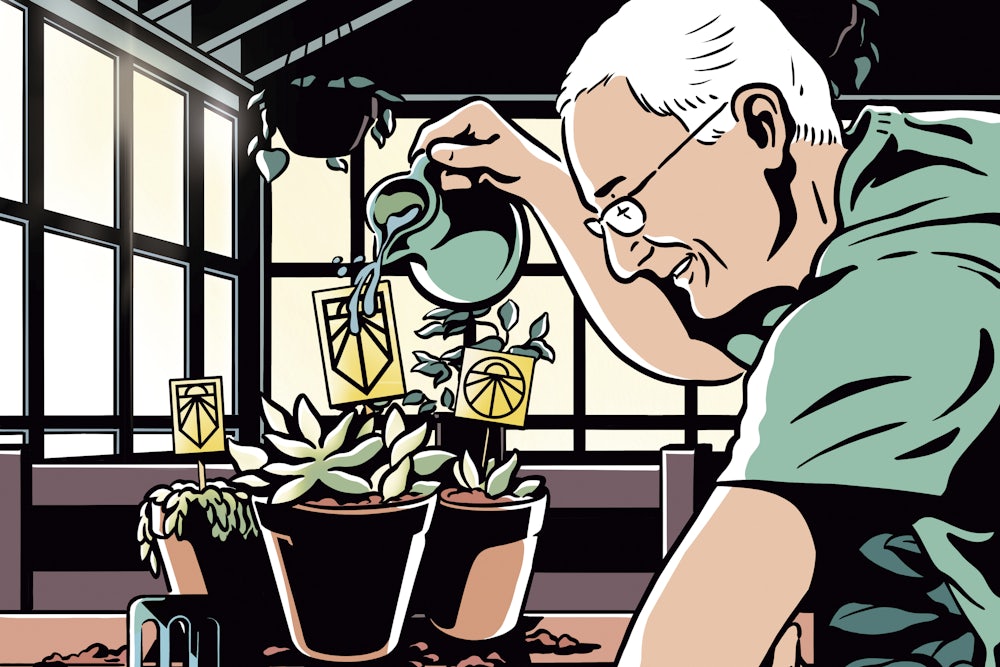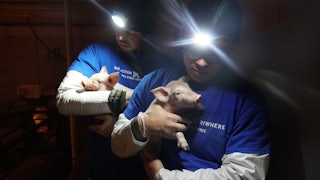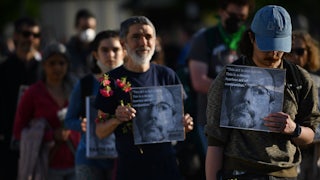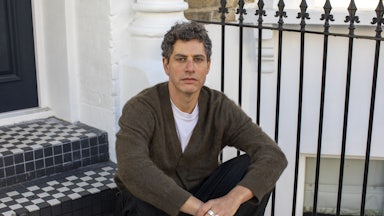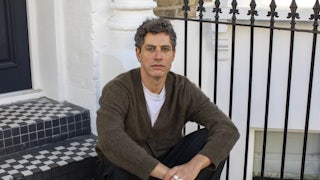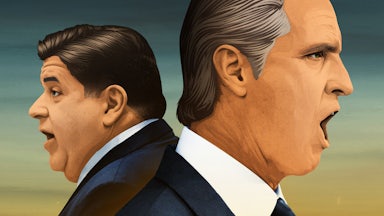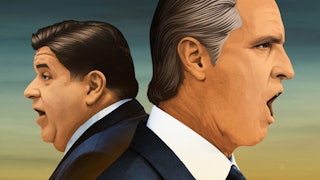On Capitol Hill, the youthful activists of the Sunrise Movement were personae non gratae in official Washington. It was November 2018, and the progressive climate group had staged a viral sit-in protest in Nancy Pelosi’s office to demand the incoming House speaker embrace its Green New Deal. But at a D.C.-based climate nonprofit’s holiday party the next month, the twentysomethings leading Sunrise were embraced as the guests of the hour.
At that ritzy gathering, Evan Weber spotted John Podesta, a figure only known to Sunrise’s then-political director as someone he’d read about in the news. When a mutual connection introduced them, Podesta handed Weber his card, suggesting they find a time to talk. Weber thought that was a nice if meaningless gesture in a town that thrives on them.
He and Podesta did talk soon thereafter, however—and many times later while Weber still worked for Sunrise.
The pair made for strange bedfellows. Podesta, who was nearly 70, had helmed Hillary Clinton’s failed 2016 bid and spent his free time training for marathons. The 27-year-old Weber had backed Bernie Sanders during that bitter primary and was known for cajoling his fellow Sunrisers into joining him for karaoke ragers. At first, Weber was skeptical. “Podesta was obviously leading Clinton World,” he recently told me, “and you know, there were some shady tactics that were going on that I don’t look back on positively when I think about the 2016 campaign.” But the two found they agreed, broadly, on the narrative and framing of the climate crisis: It was urgent, and addressing it should be connected to building a more equitable economy. The Center for American Progress, the liberal think tank Podesta founded in 2003 after his stint as Bill Clinton’s White House chief of staff, endorsed the Green New Deal resolution when it debuted in February 2019.
I’ve been hearing some variations on this story about Podesta from the new generation of climate activists and public servants ever since the 2020 presidential campaign. The particulars are distinct, but the interactions follow the same shape: a promising newcomer, an email or phone call, and some assistance—a conversation, advice, or a greasing of the skids with political gatekeepers. The beneficiaries have ranged from punchy outsiders like Weber to wonky insiders like Ana Unruh Cohen, one of Podesta’s many climate mentees and staff director of the House’s Select Committee on the Climate Crisis.
Podesta insists he is semiretired, remaining at the helm of CAP’s board as a sort of lion in winter. Podesta had been a member of the Clintons’ and then Barack Obama’s inner circle, not Joe Biden’s, a reality that limits the extent of his influence in the current administration. But that semiretirement coincides with his party’s—and perhaps the planet’s—last chance to reverse a cataclysmic trajectory toward climate devastation. So Podesta has been quietly nurturing the climate movement’s next generation of leaders to make sure the planet gets a fair shake before the narrow window for action closes, maybe for good.
Christy Goldfuss, head of energy and environmental policy at CAP, struggled to absorb what Podesta told her when the two grabbed coffee in the winter of 2017: After Clinton’s stunning defeat, Podesta wanted to return to work with Goldfuss’s team. She recalled that this “felt like it was too small for him.” Just months earlier, Podesta had been the chief architect of a presidential campaign. In that would-be White House that never was, Podesta would have likely served as some kind of special adviser.
The weeks that followed Donald Trump’s victory were gutting for Podesta, and he hadn’t been sure what he would do next. But his decades of public service had convinced him that the climate crisis required his attention. His first job out of Georgetown Law had been as a trial lawyer for the Justice Department’s Land and Natural Resources Division. He had helped steer White House climate priorities as Bill Clinton’s chief of staff. From his perch at CAP in the 2000s, he’d watched negotiations over the country’s best chance at clean energy legislation collapse in 2010. When Democrats lost control of the House that year, Obama’s climate ambitions collapsed, too. So Podesta joined the administration in 2014 and deputized himself as the president’s climate adviser, a role he accepted once he knew that the administration was taking climate policy seriously.
The 2016 electoral votes scrapped his hopes of an ambitious Clinton climate agenda, so Podesta set himself to preparing for Democrats’ next at bat. (Podesta declined to comment for this article, “to keep the spotlight on the work and the people carrying it forward and not on himself,” a spokesperson said.)
Policy details weren’t the sticking point, Podesta maintained. A cottage industry of think tanks, including his own, had developed countless ideas for addressing the crisis. Instead, the trouble was politics—or, rather, the politicians themselves. Democratic primary voters put climate change near the top of their priorities in polls, but much of the Democratic political establishment still talked about it as a niche concern of college students. Candidate Biden lagged in ambition—and Democratic rivals criticized him when his advisers suggested he’d seek a “middle ground.” As the 2020 primary unfolded, Podesta wanted to see the candidates—especially Middle-Class Joe—talk about climate as a way to transform society and put people to work.
The three-hour drive last year from her home in Oakland through the mountains to the Lake Tahoe vacation town of Truckee, California, was long enough for Lauren Sanchez to listen to three recent podcast episodes on which Podesta had participated. Sanchez wanted to be prepared. A few weeks earlier, the 32-year-old had left her post at the White House on U.S. climate envoy John Kerry’s team to accept a job as climate adviser to California Governor Gavin Newsom. Podesta sent her an email applauding the move. It couldn’t have been easy to walk away in the midst of Democrats’ fleeting governing moment, he offered, but to shape the climate policy for the Golden State, both a liberal bastion and the world’s fifth-largest economy, was a perfect opportunity. He floated a meeting: Would Sanchez want to take a hike with him and his wife near their California home?
“Not to purport that I’m Luke Skywalker in this story,” Sanchez explained, “but I felt like the young Jedi driving to see Yoda in the mountains of the Sierra.”
For eight hours, they scrambled over boulders against the backdrop of clustered pine trees and dramatic cliffs, the sinewy Podesta keeping pace with his visitor four decades younger than he. Sanchez fired off weighty questions. Is capitalism compatible with a carbon-free economy? Podesta’s responses were insightful and generous, Sanchez recalled. In addition to being Jedi master to the next generation of climate leaders, “he’s very much a conductor of our movement’s grand orchestra,” Sanchez said.
Podesta has been searching for the next generation of climate activists and policy experts, like Sanchez, who could help usher in the urgent change he hoped to see—“a real commitment to mining the farm team,” in the words of one ally. “For someone with decades of time in and around politics, he approaches his work on climate in a very fresh way,” said Ali Zaidi, the White House climate adviser. “He’s on the cutting edge of connecting the dots between climate action and other critical progressive objectives.”
“He doesn’t try to be the dean of the green advocacy machine,” in the words of one ally, and given his limited reach in Biden World, he lacks any sort of Midas touch. At this phase, he’s simply another creative political mind lending what he can to the issue about which he cares the most.
Nowhere is that clearer than the unlikely pairing of the consummate Washington insider with the rambunctious youthful outsiders in the Sunrise Movement. “The power that Sunrise brought to the climate movement was so obvious,” Goldfuss said. The two, as might be expected, often disagreed: Weber and his fellow Sunrisers sought more urgency around climate goals, and Podesta was more concerned about getting the frame of the message right. But at a small strategy meeting in early 2019, Weber was surprised to hear Podesta agree with points that he and other left-wing operatives in attendance—such as Saikat Chakrabarti, who was then Representative Alexandria Ocasio-Cortez’s chief of staff—were making.
It helped to have someone like Podesta on their side. “If you’re Sunrise, one of your biggest problems with the media and establishment Democratic politicians is that what you’re saying is perceived as radical or naïve or left-wing,” Weber explained. “Being able to have John say the same things as us helped us break through.” And Podesta knew there were other times for outsider activists to intervene when he, the senior statesman of Washington, could not. As the Biden transition began at the end of 2020, Podesta realized he needed Sunrise’s help. He asked his Sunrise allies if they might make some noise and publicly object to potential appointees with significant ties to the fossil fuel industry, hoping Biden might make a clean break with the precedent from past Democratic administrations, which had welcomed the revolving door from those industries into key climate and energy jobs. It was the right role for Sunrise, which demanded purity tests, and not for Podesta, who had worked alongside some of those industry-friendly folks.
Of course, Podesta and his allies have yet to succeed. But Weber has faith in a past political battle that Podesta often turns to as an analogy for the climate fight: the Affordable Care Act. It took decades of pushing health care reform before the bill passed, and Obama ran on reforms more sweeping than the ultimate law. But once it passed, it became so embedded in the country’s fabric that the only politically palatable option is for it to be improved, not taken away. Weber looks at climate promises of Build Back Better, Biden’s defunct domestic agenda, as the starting point, and still believes it’s about building up, not breaking down. “This is no Cinderella story,” Weber said, “but I have not given up hope yet.”
